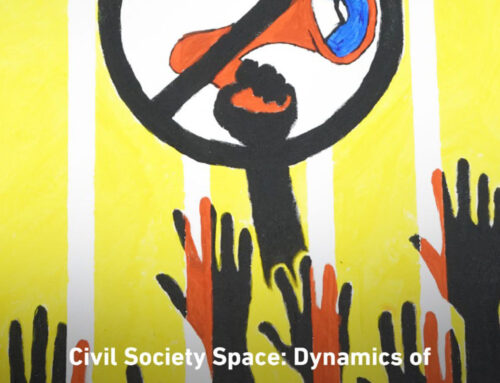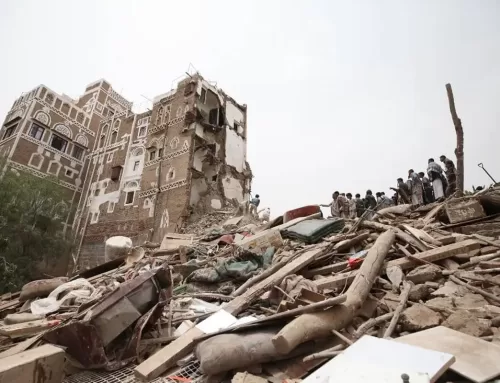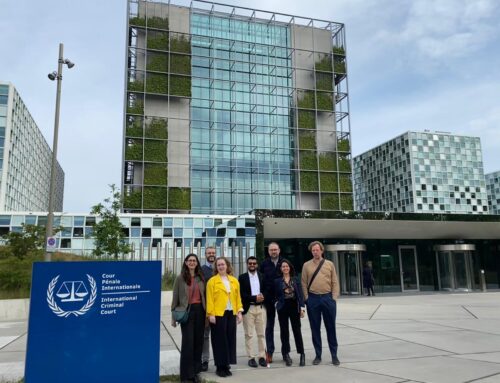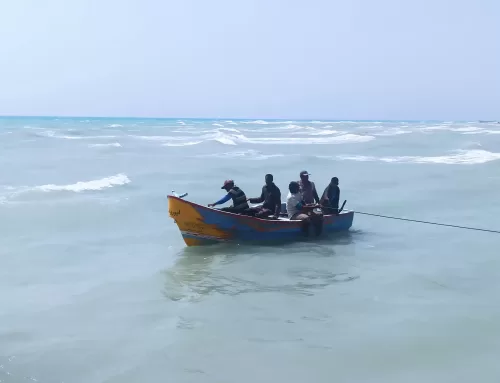
Two children walking on the rubble of their destroyed home in Thabat, Taizz city. photo credit: Ahmed Al-Basha (March 18, 2018).
For the Human Rights Council to Renew the Mandate of the Group of Eminent Experts and to Enhance its Work
Tuesday (September 25th, 2018) – Sana’a
Mwatana for Human Rights stated that all parties to the conflict in Yemen continue to violate the international human rights law and international humanitarian law. Mwatana stressed that the Human Rights Council should renew and strengthen the mandate of the Group of Eminent Experts on Yemen by improving its reporting mechanism and strengthening the rhetoric on accountability, and should consider this issue as a priority for the current thirty-ninth session.
The armed conflict in Yemen erupted after the Ansar Allah group (Houthis) took over the capital, Sana’a, on September 21st, 2014. The conflict escalated in a rapid pace after a military campaign was launched on March 26th, 2015 to support President Abdu Rabbu Mansuor Hadi by the Arab Coalition that is comprised of nine countries, and led by the Kingdom of Saudi Arabia and the United Arab Emirates.
Since May 2018, Hudaydah, far west of Yemen, has witnessed a fluctuating escalation of military operations, accompanied by an intensification of airstrikes and increased military supply of Joint-Forces loyal to Saudi/UAE led Coalition to the south and south-east of the city. In the same time, the city’s neighborhoods are witnessing a series of ground attacks, mine laying and observations of the construction of marshes and trenches by Ansar Allah ” Houthis” Which makes the battle in the residential neighborhoods an imminent danger. As a result, hundreds of thousands of civilians will be deprived of life essentials like food, health care and safe water.
During the period extending from September 1st, 2017 to August 31st, 2018, Mwatana for Human Rights documented human rights violations through field surveys. Mwatana’s field team conducted at least 1319 interviews, including observations of recruitment and use of children. These interviews were conducted with victims and relatives of victims, eyewitnesses and paramedics. .
“The Human Rights Council must stand firmly against the violations committed by all parties to the conflict in Yemen and not cave to the opposing voices to undermine the work of the group of eminent experts on Yemen,” said Radhya Almutawakel, Chairperson of Mwatana for Human Rights. Almutawakel called on the Human Rights Council to renew the mandate of the Group of eminent experts and to strengthen its work.
The Council had formed the Group of Eminent Experts during the 36th Session, in September 2017. The Group published its report on August 17th, 2018, which refers to the involvement of all parties to the conflict in Yemen in human rights violations.
- Air Strikes:
The air strikes launched by the coalition led by the Kingdom of Saudi Arabia and the United Arab Emirates, have entered the second half of their fourth year in Yemen and continue to take civilian lives and destroy civilian targets. Since the beginning of the year 2018, civilians have been subjected to a series of bloody air strikes.
Mwatana for Human Rights documented at least 146 air strikes on civilians and civilian objects, during the period extending from September 1st, 2017 to August 31st, 2018. These attacks killed at least 477 civilians, including 231 children and 64 women, and wounded at least 524 civilians, including 235 children, and 51 women.
On the morning of Saturday, January 27th, 2018, at about 6:30 am, coalition fighter jets launched a bomb against the house of Riad Naaman in the village of al-Raqab, in At Ta’iziyah District, in the Taizz Governorate. The attack killed two children and their mother, and wounded two other children, in addition to their father.
Abdo Abdullah (46 years old) who was an eyewitness to the incident and volunteered to help the victims confirmed that Riad and all his family members were inside the house when the bomb was launched. He said: “I rushed with some of the villagers to the house and found a pile of rubble on the children’s heads. The incident spread terror and fear in the village and every person feels like their home will be the next target of the jets.”
Concerning the same incident, Mohammed Naaman (44 years old), who is one of Riad’s relatives, said: “The wife of Riad, Ruwaida Abdo (30 years old) was preparing breakfast bread for her children, but the bomb did not let her finish. Her bread and body parts were scattered all over the place.” He pondered: “What crime did these children commit?! No one knows why the jet committed this massacre, but it did commit a dirty crime indeed.”
On Monday, June 25th, 2018, at around 12:30 am, the fighter jets of the coalition launched a series of air strikes against one the crowded quarters in the Al Ettisalat neighborhood, in the center of Amran city, located to the north of the capital Sana’a.
During that same evening, at 2:30 am, coalition fighters dropped a bomb on the Al-Jatim family home. The attack completely destroyed the house and severely damaged five other houses. The attack killed nine people, including two women and four children, and injured 19 others, including five children and five women.
Ahmad Mohammed al-Mukhadi (48 years old), who was the neighbor of the Al-Jatim family said in his testimony: “I was in the courtyard of my house and I suddenly felt that something hit my head and I fell to the ground. I heard my wife and daughter screaming so I got up and tried to find the door despite all of the dust but I couldn’t find it because the explosion had blown it off.” Ahmad added: “My wife and daughters were taken to a neighbor’s house and as I was going back to my house, I saw the house of Al-Jatim, which was totally destroyed, and I saw the head of his youngest daughter protruding from under the rubble that had buried her body. I ran with some neighbors to try and help the Al-Jatim family. The jets were still flying but we didn’t care. What more could happen to us?!”
One of the sons of Al-Jatim (23 years old) who was not in the house at the time, said: “I received a message on Whatsapp about an attack that had targeted our neighborhood. I called a neighbor who told me that our house was the target and that my brothers Saddam and Adel had been killed, and that X and Y were also killed… I could not stand it anymore. I closed the phone and went home, and I found people gathered like pilgrims around the rubble of our house.”
- Arbitrary Ground Attacks:
Arbitrary ground attacks, using indiscriminate weapons, continue to cause civilian deaths and injuries in Yemen, particularly in the governorates of Taiz, Al Hudaydah, Al Jawf, Abyan, Saada, Ma’rib and Lahj.
Mwatana has documented 84 incidents of arbitrary attacks since the beginning of September 2017 and until the end of August 2018. Most of these attacks were concentrated in the city of Taizz. At least 124 civilians, including 42 children and 16 women, were killed in these incidents, and at least 259 others, including 108 children and 13 women, were injured. Ansar Allah group (Houthis) bear the responsibility for most of these bloody attacks, while the Hadi Government and Coalition forces bear responsibility for 20 arbitrary ground attacks.
On Monday, April 2nd, 2018, at approximately 6:30 pm, a shell exploded 15 meters north of Samed Idris’ house in the village of Al Aawja’, in Tur Al Bahah District, in the Lahij governorate. This attack wounded a child and two women.
Many of the residents of this area have been displaced because of the repeated rocket attacks. According to eyewitnesses, the shell that fell on the house of Samed came from the mountains surrounding the Al Aawja’ area, where there are fighters from Ansar Allah group (Houthis).
Samed’s father, Idriss Abdul Ghani (50 years old), said while pointing to where the shell fell: “The shell fell here and the shrapnel penetrated the house. The shrapnel injured my grandson, Moufid (4 years old), in his feet and left hip. Moufid can no longer move in a normal manner. Every time he tries to walk, he falls to the ground.”
When Mwatana visited the location of the incident, the relatives of the victims were very affected and preferred not to talk about the attack. When Samed’s father started talking about the incident, his grandson Moufid started crying a lot.
On Sunday, December 24th, 2017, at approximately 3:00 am, the two-story house of Daifullah Jaber was hit by three artillery shells that completely destroyed it and killed the whole family of seven, including a woman and three children. The house is located in Al-Shoumiyah area, in the Ghamr District, in Saada Governorate. The village overlooks the Saudi border and according to witnesses, it is occasionally attacked by the artillery shells of the Saudi border guards.
One of the victims’ relatives said the following in his testimony concerning the attack that targeted the house of Daifullah: “The first shell landed on the top floor of the house where Fatima Saleh (28 years old) and her child, Shafiq Ali (6 years old), were instantly killed. The second shell fell on Khaled Hussein (27 years old) at the gate of the house. The rest of the family members who were in the house, were killed by the third shell that hit the western room where they were hiding.”
On Sunday, July 29th, 2018, at approximately 10:30 am, a projectile fell on one of the side streets in Mehwa al-Khalif, At Tuhayat District in Al Hudaydah governorate. One civilian was killed and five children were wounded while playing in front of their house.
One of the victims’ relatives said: “I was on my way to buy some items from the city of Zabid when I heard an explosion that I felt was in my village and I came back right away. I saw my brother. His hands were amputated and blood was flowing from his chest. One of the town’s residents tried to take him to the hospital but he passed away before they made it.”
Eyewitnesses believe that the projectile come from the western side of the At Tuhayat District center where the Joint Forces of the coalition led by Saudi Arabia and the UAE are stationed.
- Use of Mines:
Mwatana documented at least 35 incidents of mines exploding in 9 Yemeni governorates: Al Hudaydah, Saada, Lahj, Abyan, Al Bayda, Hajjah, Taizz, Shabwah and Al Jawf, during the period between September 2017 and August 2018, during which 31 civilians were killed at least, including eight children and five women, and 48 civilians at least were injured, including 32 children and seven women. The Ansar Allah group (Houthis) planted 32 mines.
On Friday, February 9th, 2018, at around 7:00 am, a landmine exploded in Al Bayda region, in the Al Maslub District in Al Jawf Governorate. The explosion of the landmine killed one child and two women and injured another woman while their cattle were grazing and they were collecting fodder. Twenty minutes later, one of the victim’s relatives tried to rescue the injured woman on board a Toyota Pickup (Chasse) vehicle, but he detonated another mine, which killed him and destroyed his car.
Al Baydah region has been under the control of the Popular Resistance Army since January 2016. According to statements by the people of the area, Ansar Allah group (Houthis) planted many mines before withdrawing from the area.
On Tuesday, July 31st, 2018, at around 9:00 am, a medium-sized bus carrying eight women and two children detonated a landmine while it was heading on a side street in the Jalla area, east of At Tuhayat District in Al Hudaydah Governorate. One child was killed and the other child’s leg was amputated. According to eyewitnesses, the mine was planted the night before the incident by Ansar Allah group (Houthis).
- Recruiting and Using Children:
Between September 2017 and August 2018, Mwatana for Human Rights documented at least 601 cases of recruitment or use of children. The parties involved in the conflict were involved in the recruitment of 1,100 children. The Ansar Allah group (Houthis) recruited 54% of these children. This percentage was concentrated in the governorates of Saada, Taiz and Sana’a, while the forces of the security belt and the Hadrami and Shabwani Elite Forces backed by the UAE mobilized 26%. This percentage was concentrated in the governorates of Abyan and Lahj. The percentage of children recruited by the forces loyal to President Hadi and the Popular Resistance Committees reached 19%, and this percentage was concentrated in the governorates of Abyan and Al Bayda, while 1% of the documented recruitment cases were by jihadi groups or groups that were not identified.
- Arbitrary Detention, Enforced Disappearance and Torture:
Mwatana for Human Rights documented at least 27 cases of arbitrary detention, 43 cases of enforced disappearance and five cases of torture during the period between September 2017 and August 2018. The Ansar Allah group (Houthis) bears the responsibility for all these incidents.
In the same period, Mwatana documented at least 23 cases of arbitrary detention, 12 cases of enforced disappearances and 21 cases of torture. Responsibility for these incidents falls upon the forces loyal to President Abdrabbuh Mansur Hadi, the security belt forces, the Hadrami and Shabwani Elite Forces and fighters from Salafist groups supported by the UAE.
On Friday, June 15th, 2018, at approximately 03:00 am, Abdul Malek Ali Al-Nahari (33 years old) was arrested at Falaj point in the governorate of Ma’rib. Abdul Malek was immediately detained and transferred to the Ma’rib security headquarters and he is still detained until now.
Ahmad (a pseudonym) said: “Abdul Malek was returning from Saudi Arabia to his village to spend the Eid al-Fitr holiday when he arrived at the Falaj point and was arrested under the pretext of having a communication issued against him. He was detained for 10 days in the governorate’s security headquarters without being interrogated. We were allowed to visit him only after he was transferred at a later time to the Political Security building.”
According to Ahmad, the Political Security authorities in Ma’rib governorate proposed to the family of Abdul Malek to release Abdul Malek through exchanging prisoners with the Houthis. The family rejected this offer because Abdul Malek had nothing to do with the Ansar Allah group (Houthis).
On Sunday, December 3rd, 2017, at approximately 03:00 am, a group of armed men stormed the house of Jamal Abdrabbuh (23 years old), in Al Buraiqeh District, in the Aden Governorate, and took him and his minor brother to an unknown destination. The victims remain under enforced disappearance until today.
Ayman (a pseudonym) said in his testimony: “I was horrified when I saw black shadows holding rifles and dragging away Jamal and his brother. One of the residents of the neighborhood asked: ‘Who are you?’ One of the gunmen, wearing black clothes and a black mask, shouted: Shut up. Don’t you dare say a word.”
Security officials in the security belt denied the presence of the two victims in their prisons, while their family later learned from one of the former detainees that he saw Jamal and his brother in the prison of Bir Ahmed, which is affiliated with the security belt forces.
On Tuesday, October 1st, 2017, at approximately 5:30 pm, gunmen broke into the house of a relative of Adnan Abdo Mejzher (54 years old) in Dhamar. The gunmen blindfolded Adnan and took him to an unknown place. He spent 50 days in detention, during which he was subjected to torture, ill-treatment and was coerced to give confessions. He was released after that period during a prisoner exchange deal.
In his testimony, Adnan said: “They took me to an unknown place and put me in a bathroom for almost a month. They would take me out of the bathroom to the interrogation room and would torture me for about seven hours in order to coerce me to confess to charges I did not commit. After four days of torture, I gave them the confessions they wanted to hear in the format they wanted.” When describing how he was tortured, Adnan added: “They would hang me on a metal pole for seven hours, during which they would kick me and beat me with batons and electrocute me with an electric wire that was tied to my hand.”
Adnan also reported that he was later placed in an underground room called “Al-Daghata” for 13 days, which is a small room, 1 meter high, 80 cm wide and 120 cm long. He was forced to spend all his time inside that room and to eat, drink and relieve himself in it. He was then transferred to a four-meter-wide prison with 43 detainees where he spent the remaining time.
- Violations against the press
Mwatana documented no less than seven incidents of violations against journalists and media outlets in the period of September, 2017 to August, 2018; four of which were documented in areas controlled by Hadi government and the Saudi Emarati led coalition, and three were documented in areas controlled by Ansar Allah (Houthis).
12 journalists are still arbitrary detained and forcibly disappeared by Ansar Allah (Houthis) group. The journalists were detained in different times in 2015 and 2016. Houthis still block most of the online news websites since they control Yemen Net, the only internet service provider in Yemen.
In early 2018, Yemeni Journalists’ Syndicate issued a report about freedom of press in the first half of 2018. The report includes 100 incidents of violations against the press which include arbitrary detention, assault, killing and other types of violations.
- The persecution of the Baha’i minority
In 2017, Mwatana documented seven cases of arbitrary detention against members of the Baha’i community; four of which are still forcibly disappeared. In early 2018, Mwatana called for rescinding the Special Penal Court verdict issued on January 2nd, 2018 against Hamid Haidrah (52 years old) sentencing him to death and for all his belongings to be confiscated. In September, 2018, the Special Penal Court ordered members from the Baha’i community to come for interrogation, and on September 15th, 2018, the trial for 23 members of the Baha’i community, including eight women and a child, started in secret without notifying their attorneys or families. In addition to the same charges Mr. Hamid Haidrah received, the Yemenis among the group were charged with apostacy.
Additionally, the authorities of Aden international airport, loyal to Hadi government and the Saudi-Emirati led coalition, detained two members of the Baha’i community and handed them over to the Emirati authorities. They were, later, freed ahead of the 36th session of the Human Rights Council in September 2017.
- Attacks against Schools and Use of Schools:
Schools in Yemen are subjected to a number of attacks, such as aerial bombardment, ground shelling, occupation and military use.
Mwatana for Human Rights investigated (39) incidents of attacks against schools and educational facilities, including (10) aerial attacks, (7) incidents of land attacks, and (26) cases of occupation or use for military purposes. The Ansar Allah group (Houthis) is responsible for 21 incidents, while forces loyal to President Hadi and forces supported by the United Arab Emirates are responsible for 14 incidents. The parties bear joint responsibility in four other cases.
- Attacks against Hospitals and Medical Personnel:
Mwatana investigated at least 17 incidents of assault on hospitals. The coalition and the forces loyal to the UAE bear responsibility for 10 of these incidents, while Ansar Allah group (Houthis) bears responsibility for two cases. Popular resistance and forces loyal to President Abd Rabbuh Mansur Hadi also bear responsibility for at least two incidents.
At approximately 1:00 pm on Wednesday, August 8th, 2018, armed groups belonging to the Abu Abbas Brigades in Taizz, a Salafist group backed by the United Arab Emirates, launched an armed attack on the Republican Educational Hospital in Al Qahirah District in the Taizz Governorate. Eyewitnesses said that Abu Abbas’s gunmen came to the hospital under the pretext of hospitalizing their men who were wounded during the clashes that took place between them and units of the army loyal to President Hadi. After entering the hospital premises, the Abu Abbas Brigades gunmen stationed themselves on the roofs of the hospital facilities and then they opened fire on the doors and locks of the stores and the doctors’ rooms, and looted their contents that included medical equipment, medicines and the doctors’ medical supplies. The incident spread panic and fear among patients, their companions, doctors and nurses, prompting them to escape amid threats from armed groups. The incident also caused the hospital to stop functioning completely, and the hospital only resumed its work on the morning of Saturday, August 11th, 2018.
On the afternoon of August 11th, 2018, the group returned to the hospital, stormed it and fired shots at the Emergency Section, Women and Childbirth Department and the dialysis department. The attack killed a companion of a patient and one of the hospital guards and injured three other guards. After that, on August 27th, 2018, the hospital became only partially operational and most sections are still out of service until today.
On Thursday, August 16th, 2018, at around 11:30 am, an antiaircraft projectile hit the Intensive Care Building in the Al-Thawrah General Hospital, in the Salh District, in the Taiz governorate. The shrapnel from the projectile hit a patient’s companion, a nurse and a security guard. Eyewitnesses believe that the projectile came from the direction of the Al-Silal hills, which are under the control of Ansar Allah Group (Houthis).
- Denial of Humanitarian Aid Access:
The war has turned the humanitarian situation in Yemen into the biggest humanitarian crisis in the world. On September 21st, 2018, Mark Lowcock, Under-Secretary-General for Humanitarian Affairs and Emergency Relief Coordinator, briefed the security council saying, “We are losing the fight against famine. The position has deteriorated in an alarming way in recent weeks. We may now be approaching a tipping point, beyond which it will be impossible to prevent massive loss of life as a result of widespread famine across the country. The escalation of military operations in Al Hudaydah governorate recently will not only impact the lives of civilians there, but it would also impact the arrival of food and humanitarian aid to the whole country through Al Hudaydah port.
The Saudi-Emirati-led Coalition’s imposition of strict measures on land and sea ports, which constitutes an obstacle to the flow of relief and basic items, has exacerbated this crisis. After the Coalition took full control over airspace in March 2015, it closed Sana’a International Airport for business flights starting from August 2016 until today, which makes it difficult for civilians to travel to the airports of Aden and Seiyun that are 350 – 860 kilometers away, interspersed with many checkpoints and front lines.
The recent surge in military operations in the Al Hudaydah Governorate could affect access to humanitarian aid and food supplies through the Al Hudaydah port, making millions of Yemenis vulnerable.
Mwatana for human rights investigated 33 cases of denial of humanitarian aid access, attacking or attempting to loot humanitarian aid in six Yemeni governorates: Saada, Taiz, Al Hudaydah, Al Mahwit, Amanat Al-Asemah and Dhamar. The Ansar Allah group (Houthis) is responsible for most of these incidents, while the coalition and forces loyal to Hadi bear responsibility in at least five incidents.
Almutawakel stated: “The number of human rights violations and of victims has increased in an alarming manner and the human rights council shouldn’t stand idly by in the face of this situation.”





